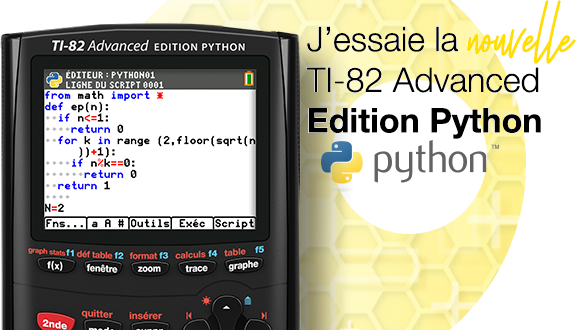Je viens de faire une premiere release: https://github.com/TI-Planet/eval_expr avec documentation, examples etc.

Je reprends ca ici pour le fun:
eval_expr
A TI-Nspire CX II python library to evaluate arbitrary TI-Basic expressions.
Context
TI provides useful functions in their ti_system module.
Among those, there iseval_function("name",value)which "evaluates a predefined OS function at the specified value".
That's good but not good enough to evaluate any function that takes more than a single argument, for instance... And it seems to be restricted to numerical stuff only, too.
How are we supposed to do fancy math stuff from Python?
In fact, people have started asking this question on TI-Planet for instance, where someone wanted to have access to specfunc for Laplace transforms. That's when I started to dig in and see if there was any way to do more than justeval_function...
How does this library work?
Well, it turns out that theti_systemmodule also has some internal/lower-level functions exposed (but not listed in the menus), likewriteSTandreadST(which I guess is used by other higher-level functions likestore_valueandrecall_value), which interact with the Symbol Table which is basically where variables are stored and shared.
Interestingly,recall_valueseems to be able to evaluate the input and return the output, with much less restrictions!
So, the library leverages that, with some pre- and post-processing to work around some quirks, but it seems to work relatively well.
Installation
- Download the .tns file from the latest release page.
- Transfer it to your calculator, in the PyLib folder.
- Enjoy!
Usage
Just import the module and use the functions it provides:eval_exprandcall_func.
If you just need theeval_exprfunction, you can just do this:from eval_expr import eval_expr.
Aliases (caseval,eval_native) toeval_exprare provided for convenience, for compatibility purposes, if you import the whole module.
Documentation
eval_expr(expr, trypyeval=False):
This is the main function of the library. Pass a TI-Basic expression (you'll probably want to make that a string) in the first argument and it will try to evaluate it and return the result as a native Python type, otherwise a string.
If you passTrueas the 2nd argument (optional, it'sFalseby default), it will try to actually evaluate the output in Python. This can be useful for numerical results.
For instance, on an exact-math Nspire (CX II-T) or a CAS model,eval_expr("sqrt(90)")would give you'3*sqrt(10)'. Buteval_expr("sqrt(90)", True)returns9.486832980505138.
Notes: complex numbers uses theimath symbol (looks like𝒊) but in Python it's just the letterj. Substitution from Basic to Python is handled automatically, just like the symbols (√,π,𝒆).call_func(funcname, *pyargs):
This builds on top ofeval_exprin order to provide a more powerfuleval_functionthat theti_systemmodule offers.
This is a variadic function, meaning you can pass any number of arguments you want, for instancecall_func("log", 2, 3.0)which will give0.63093.
The function returnsNoneif the output is the same as the input, meaning it couldn't be evaluated. This allows you to easily handle this case in your scripts.
Caveats
- TI-Basic lists (
{...}) aren't automatically converted to/from Python lists[...]. In a next version?- No automatic substitution is done from Python to Basic. In a next version?
If you find a bug, a weird behavior, or if you want to submit feedback or give ideas in general, please open an issue here
Examples
Here's a screenshot with a few expressions: (note that@iis a way on the Nspire software to quickly get the complex i symbol)
In the future...
Well, I've contacted TI to see if they could add this kind of feature natively so that we don't need to resort to weird tricks, and they've replied that they're analyzing my feedback, so there's hope for a future update

















